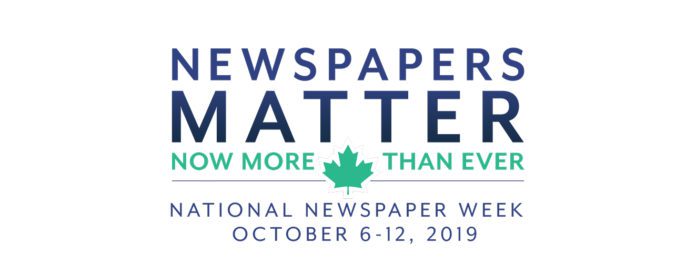This is National Newspaper Week in Canada: a chance to think about the place of the print media in society today and the growing importance of on-line versions of newspapers and news outlets. It may seem a bit self-serving for a newspaper to encourage discussion of its own existence, but, since we spend most the year talking about everything else in our community, one week focusing on the paper doesn’t seem too outrageous, does it?
Actually, our community may be a little unusual, in that it does talk about the role of newspapers quite a bit all through the year; usually when someone objects to things they read here. “You’re too opinionated!” “Newspapers are no place to talk about religion!” “You only tell one side of the story!” These, and many other comments arrive in our mailbox quite regularly. Along with, let it be said, many more from people who do like the Times.
In the period of New France, before Britain took control of this part of North America, the French Crown had a few very strict rules about the running of their colony. One of these was that no newspapers were allowed. (No lawyers or Protestants, either, in fact). Monarchs knew, and in the case of the British, came to know around 1776, that newspapers can be dangerous things. They allow ideas to spread and get discussed. They encourage differing ideologies and philosophies to be promoted and debated in an open and very transparent way.
Even in our own day, the murder of journalists all over the world is testament to the power and influence the newspaper can have in a society. The most recent and public example, the murder of Jamal Khashoggi, columnist for the Washington Post, by the Saudi Arabian regime, was a sharp reminder that talking and writing openly can be a dangerous occupation. Oppressive regimes, and those built on corruption and divisiveness, never want a free press. They become the “Enemy of the People”, the Fake News merchants. It is terribly ironic that, in the country where a free press was first protected in law, the United States administration has turned on its journalists because of their success in throwing a light on otherwise hidden events and disreputable characters.
But we live in Canada, in a nice municipality where those things don’t happen. Is that not so? Of course, it was the last municipal council here that accused this newspaper of “threatening the democratic rights of the people of North Grenville”. Doesn’t that now sound simply ridiculous?
The question I would like to ask this week is: what kind of newspaper do the people of North Grenville, and Merrickvile-Wolford, want? Do we just want straight reporting of selected events? This event happened. This person said this. That person said that. End of report. Or do we want context: this is why this happened, this is what is important about it. As I’ve written many times before, newspapers have not always been as they are today. In fact, the idea that writers should be “objective, balanced and neutral” is a very recent development.
There is no such thing as objectivity in that way. Just deciding what to write about is a subjective thing. Someone decides that this is worth writing about, while that other thing isn’t. We are slowly coming to understand that what we read and see and hear in the media has been chosen for us by others, whether a human Editor, Publisher, or Owner, or else an algorithm that has been designed to give us what we’ve looked at before.
Whether it’s Facebook, or some other social media platform, we really don’t choose what we browse. We are fed more of what we have already indicated we are interested in. Newspapers are different, especially local ones, like the Times. We try and reflect the community, giving a voice to all shades of opinion, whether we agree with them or not. Letter writers give their opinion on things, as do others who write in the paper. We at least know what they think, and can therefore judge what they write in that context. The thing that matters is that what is written is accurate and true, so far as we can determine that.
Everyone has a voice, everyone has a point of view, and everyone is free to express that in these pages. The only exception will be those that we, as a community, have decided should not be given that platform: the openly racist, misogynist, bigoted, spreaders of hate and division. Is that what you, the reader, want from the Times? Is there something that we do that you find objectionable? Are there things we should be doing that we’re not?
Every week, I am frustrated that we can’t cover everything that is happening in our community. There’s simply not enough space for all that we as friends and neighbours are doing together. I also think that it is wonderful, as an Editor, to have such a problem. This newspaper is free to you, delivered to your door by Canada Post at a cost. Printed at a cost. If you’d rather not read it, don’t. Put it straight into the garbage. If you want to make it better, write letters, articles, whatever you think is missing now. Tell us what you want to see in your local newspaper. The Times is the Voice of North Grenville and Merrickvile-Wolford only because it is your voice. It has no other value. Newspapers matter. Now more than ever.








